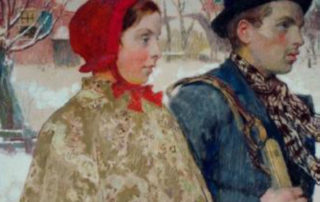Rachel Stern2025-03-26T16:04:21-04:00February 14th, 2025|Events, Lectures, Past Events|
Journalist and author Michael Sontheimer speaks about Alfred Flechtheim, who was born in 1878 in Münster as the son of a wealthy German Jewish grain dealer. He was trained as a trader but did not want to stay in the family business. As he was fascinated with art, he left his hometown and moved to Düsseldorf, where he opened a gallery in 1913. Image above: Rudolf Großmann, Alfred Flechtheim, 1922-27. Pencil, ink, and gouache on paper, 5.3 x 3.8 in. Museum für Moderne Kunst, Freiburg (Germany) G 62/008 b. After serving in the German Army during the First World War, in 1921 he opened a second gallery in Berlin, the place to be in the 1920s. [...]
Rachel Stern2022-11-24T05:24:57-05:00November 10th, 2022|Events, Past Events|
In the aftermath of the Holocaust, the unprecedented destruction and plight of survivors prompts the unthinkable - German and Jewish leaders meet in secret to grapple with the first reparations in history, resulting in the groundbreaking Luxembourg Agreements of 1952. Screening followed by Q+A with Gideon Taylor and Karen Heilig, from the Conference on Jewish Material Claims Against Germany. Watch the Trailer: SCREENINGS In the aftermath of the Holocaust, German and Jewish leaders met in secret to negotiate the unthinkable – compensation for the survivors of the largest mass genocide in history. Survivors were in urgent need of help, but how could reparations be determined for the unprecedented destruction [...]
Rachel Stern2022-02-18T05:29:09-05:00May 30th, 2021|Events, Lectures, Past Events|
MARI is innovative in many ways. For the first time, descendants of victims of Nazi persecution are cooperating with German institutions in a public/private partnership in provenance research. After an initial three-year research period, the successful project at Freie Universität Berlin is now being continued. Numerous works from the former Mosse collection have already been recovered and restituted. In the process, surprising stories came to light showing the whole challenge range of provenance research and restitution. MARI's task, however, is not only to search for the works of the former collection, but also to gain insight into the strategies of the so called “Gleichschaltung” (consolidation) of the press just after the Nazis came to power in 1933, as well [...]
Newsletter #3 October 2015
Rachel Stern2016-12-08T00:03:24-05:00October 25th, 2015|Newsletter|
Best wishes to our Jewish friends in 5776! May it be a good and peaceful year for everyone. EXHIBITION A few days ago, the exhibition "»Making Amends« Compensation and Restitutions in a Divided Berlin" was opened at the Gedenkstätte deutscher Widerstand in Berlin. The exhibition, which was organized by a team of the Aktives Museum and the Gedenk- und Bildungsstätte Haus der Wannsee-Konferenz Berlin is celebrating the 70th anniversary of the liberation from the Nazi terror regime with this in-depth examination of the practice of restitution after 1945. Especially in Berlin, where during the Cold War two completely different concepts of restitution existed side-by-side, their political framework and its consequences for the restitution procedures can be demonstrated like nowhere else. [...]






